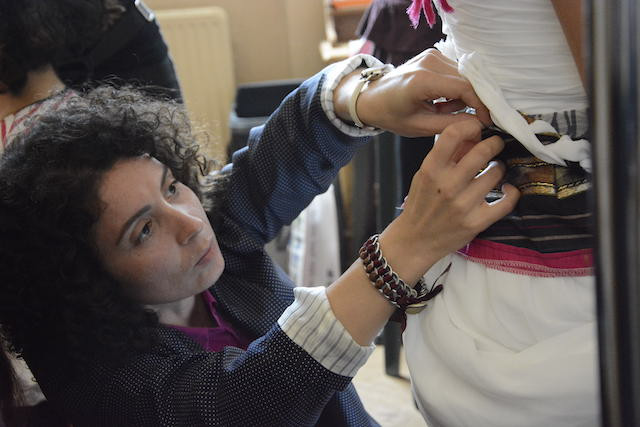It also spawned the Fashion Revolution movement, pushing for transparency on where and how clothing is made by each year commemorating this tragedy with a week of awareness-raising activities every April.
“I come from a family that is close to issues relating to the environment and respecting everything around us,” says Stylianee Parascha, who is Country Coordinator of the Fashion Revolution, bringing the movement to Luxembourg for the first time with an event on 29 April.
Parascha said she had always been interested in environmental issues and her mother’s keen interest in the origin of clothing quickly wore off on her.
Shortly after graduating she landed her dream job as a fashion designer in her native Greece working for an environmentally sustainable firm. Then, seven years ago, she moved to Luxembourg where she founded her own ethical clothing label What.Eve.Wears.
“I think we’ve the momentum right now (for ethical fashion). Everyone is talking about it: magazines and stars and influencers are involved,” Parascha says.
But brands still have some way to go to ensure the clothing they sell meets minimum legal and ethical requirements.
While not all will audit manufacturers, some firms are not even aware if laws are being broken regarding things like safety, fair trade and working conditions because there are so many intermediaries involved in the production process.
Parascha says the only way to bring change is if consumers vote with their wallets by turning their backs on brands which break the law or refuse to be transparent about the origins of their garments.
“It’s not like I’m not tempted. But you have to think more deeply and see behind these items. When I have these thoughts and see these pretty items for €20, I think it was probably made by women suffering in Cambodia, it really puts me off wearing it!” she says.
The other challenge is the cost--ethically manufactured garments are more expensive. But Parascha points out there are alternatives.
“If you don’t want to pay more, choose something vintage or second-hand, as that’s also an area that’s progressing,” she said, referring to various Facebook sale groups and sites like Etsy.
Fashion Revolution in Luxembourg
To drive the message home, Parascha and other actors in the ethical clothing industry in Luxembourg, such as Impashion and Caritas, are organising Fashion Revolution at Rotondes.
The day will consist of an ethical clothing market with vendors from Luxembourg, a knitting workshop from Mamie et Moi, upcycle-your-T-shirt workshops for adults and young people, a panel discussion and screening of the documentary “Slowing Down Fast Fashion”.
Interested people who are unable to attend can mark the occasion in another way. The Fashion Revolution is calling on conscientious consumers to post a selfie wearing their clothes inside-out to expose the label with the question “Who made my clothes?”.
“This is something that you can do. Because every year it grows and because so many people are asking now some companies come back and with nice examples of photos of production. Others never come back and you know there’s a problem because they don’t want transparency,” says Parascha.
Find out more by visiting Fashion Revolution Luxembourg on Facebook.
